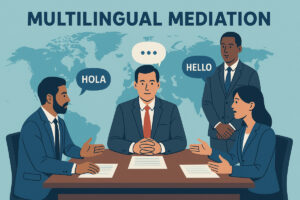TLDR:
Multilingual mediation helps resolve international business disputes by removing language barriers and promoting clear communication between parties. It’s faster and more cost-effective than traditional litigation or arbitration, especially in cross-border cases involving complex legal systems. By using professional interpreters, businesses can avoid misunderstandings, reduce legal expenses, and reach agreements more efficiently. For many companies, it’s becoming the smart first step in global conflict resolution.
Resolving cross-border disputes is rarely simple. Different legal systems, languages, and cultural expectations often create friction between parties. Whether the issue is a contract violation, an investor disagreement, or a trade-related concern, fast and fair resolution matters; that’s where multilingual mediation comes in.
Why Businesses Are Choosing Mediation Over Litigation

Litigation is expensive. International litigation is even more so. Add long timelines and unfamiliar legal systems, and you have a process that drains time and resources. Mediation offers a more straightforward path. It’s built on cooperation, not confrontation. Instead of waiting for a court to impose a decision, both sides work toward a mutual agreement.
When language barriers are present, multilingual mediation becomes especially useful. With professional interpreters, each party can speak freely in their native language. That clarity helps move the conversation forward and prevents costly misunderstandings.
Cutting Costs Through Clearer Communication
Miscommunication fuels conflict. Even minor disagreements can spiral into full-blown legal battles when parties don’t fully understand each other. Multilingual mediation reduces this risk from the start. It helps clarify intent, relieve tension, and avoid the need for costly legal proceedings.
Mediation also moves faster than arbitration or litigation. There’s less paperwork, fewer procedural hurdles, and often no need for formal hearings. For many companies, resolving an issue through mediation means avoiding months of drawn-out negotiations and high legal fees.
A Better Fit for Global Trade and Investment
Sectors like international trade and foreign investment benefit directly from multilingual mediation. It allows parties to protect their interests while respecting the legal norms of different countries. Some jurisdictions even view mediation as a required first step before moving to arbitration.
While arbitration still plays a role, especially in contracts governed by common law, many disputes never reach that point. Multilingual mediation resolves issues early, before positions harden or legal bills grow.
Skilled Mediators and Interpreters Make the Difference
Cross-border disputes require more than basic language skills. Mediators and interpreters must understand the legal and cultural details of each case. This is where agencies like Atlas Language Services, Inc., based in Chicago and working worldwide, provide real value.
Their interpreters don’t just speak the language. They understand legal vocabulary, regional customs, and how to manage sensitive conversations. For legal professionals and corporate teams, that level of support can mean the difference between confusion and resolution.
You can see what past clients have said or read a case study that highlights real outcomes and savings made possible through effective multilingual support.
Wrap-Up
Multilingual mediation works because it removes friction, both linguistic and legal. It helps businesses resolve disputes faster, with less risk and less cost. And it brings clarity to situations that could easily become tangled in translation.
Mediation is worth considering if you’re managing legal conflicts that span countries or languages. Contact Atlas Language Services, Inc., and we can help you run effective sessions, wherever your business takes you.
Frequently Asked Questions
What is multilingual mediation, and how does it work?
Multilingual mediation is a form of alternative dispute resolution where each party can communicate in their native language with the help of professional interpreters. A trained mediator facilitates the session, helping all sides understand each other clearly and work toward a resolution without language barriers getting in the way.
How does multilingual mediation help reduce legal costs?
By resolving disputes early in the process, multilingual mediation avoids the extended timelines and high fees associated with litigation and arbitration. It also minimizes misunderstandings that can lead to prolonged legal battles, saving both time and money.
When is mediation a better choice than arbitration or court proceedings?
Mediation is often the better choice when parties want to maintain business relationships, avoid public proceedings, and keep costs down. It’s especially effective for commercial disputes, international business disagreements, and investor concerns where a collaborative solution is still possible.
Does Atlas Language Services provide interpreters for legal mediation sessions?
Yes. Atlas Language Services offers professional, qualified interpreters experienced in legal and procedural terminology. We support mediation sessions across multiple languages to ensure every participant is fully understood, no matter the language or legal system involved.

